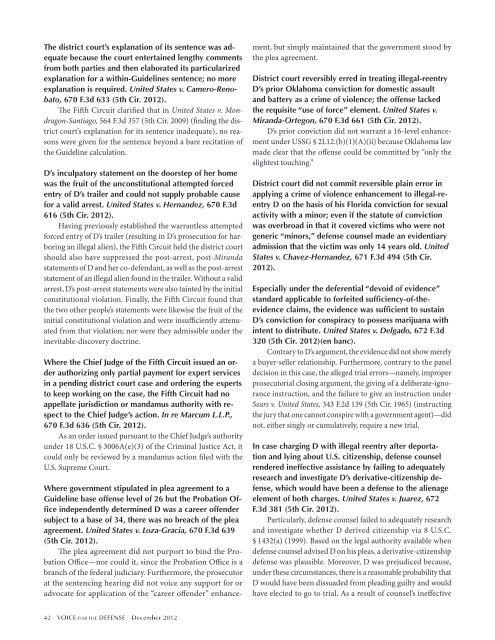tcdla - Voice For The Defense Online
tcdla - Voice For The Defense Online
tcdla - Voice For The Defense Online
Create successful ePaper yourself
Turn your PDF publications into a flip-book with our unique Google optimized e-Paper software.
<strong>The</strong> district court’s explanation of its sentence was adequate<br />
because the court entertained lengthy comments<br />
from both parties and then elaborated its particularized<br />
explanation for a within-Guidelines sentence; no more<br />
explanation is required. United States v. Camero-Renobato,<br />
670 F.3d 633 (5th Cir. 2012).<br />
<strong>The</strong> Fifth Circuit clarified that in United States v. Mondragon-Santiago,<br />
564 F.3d 357 (5th Cir. 2009) (finding the district<br />
court’s explanation for its sentence inadequate), no reasons<br />
were given for the sentence beyond a bare recitation of<br />
the Guideline calculation.<br />
D’s inculpatory statement on the doorstep of her home<br />
was the fruit of the unconstitutional attempted forced<br />
entry of D’s trailer and could not supply probable cause<br />
for a valid arrest. United States v. Hernandez, 670 F.3d<br />
616 (5th Cir. 2012).<br />
Having previously established the warrantless attempted<br />
forced entry of D’s trailer (resulting in D’s prosecution for harboring<br />
an illegal alien), the Fifth Circuit held the district court<br />
should also have suppressed the post-arrest, post-Miranda<br />
statements of D and her co-defendant, as well as the post-arrest<br />
statement of an illegal alien found in the trailer. Without a valid<br />
arrest, D’s post-arrest statements were also tainted by the initial<br />
constitutional violation. Finally, the Fifth Circuit found that<br />
the two other people’s statements were likewise the fruit of the<br />
initial constitutional violation and were insufficiently attenuated<br />
from that violation; nor were they admissible under the<br />
inevitable-discovery doctrine.<br />
Where the Chief Judge of the Fifth Circuit issued an order<br />
authorizing only partial payment for expert services<br />
in a pending district court case and ordering the experts<br />
to keep working on the case, the Fifth Circuit had no<br />
appellate jurisdiction or mandamus authority with respect<br />
to the Chief Judge’s action. In re Marcum L.L.P.,<br />
670 F.3d 636 (5th Cir. 2012).<br />
As an order issued pursuant to the Chief Judge’s authority<br />
under 18 U.S.C. § 3006A(e)(3) of the Criminal Justice Act, it<br />
could only be reviewed by a mandamus action filed with the<br />
U.S. Supreme Court.<br />
Where government stipulated in plea agreement to a<br />
Guideline base offense level of 26 but the Probation Office<br />
independently determined D was a career offender<br />
subject to a base of 34, there was no breach of the plea<br />
agreement. United States v. Loza-Gracia, 670 F.3d 639<br />
(5th Cir. 2012).<br />
<strong>The</strong> plea agreement did not purport to bind the Probation<br />
Office—nor could it, since the Probation Office is a<br />
branch of the federal judiciary. Furthermore, the prosecutor<br />
at the sentencing hearing did not voice any support for or<br />
advocate for application of the “career offender” enhance‐<br />
ment, but simply maintained that the government stood by<br />
the plea agreement.<br />
District court reversibly erred in treating illegal-reentry<br />
D’s prior Oklahoma conviction for domestic assault<br />
and battery as a crime of violence; the offense lacked<br />
the requisite “use of force” element. United States v.<br />
Miranda-Ortegon, 670 F.3d 661 (5th Cir. 2012).<br />
D’s prior conviction did not warrant a 16-level enhancement<br />
under USSG § 2L12.(b)(1)(A)(ii) because Oklahoma law<br />
made clear that the offense could be committed by “only the<br />
slightest touching.”<br />
District court did not commit reversible plain error in<br />
applying a crime of violence enhancement to illegal-reentry<br />
D on the basis of his Florida conviction for sexual<br />
activity with a minor; even if the statute of conviction<br />
was overbroad in that it covered victims who were not<br />
generic “minors,” defense counsel made an evidentiary<br />
admission that the victim was only 14 years old. United<br />
States v. Chavez-Hernandez, 671 F.3d 494 (5th Cir.<br />
2012).<br />
Especially under the deferential “devoid of evidence”<br />
standard applicable to forfeited sufficiency-of-theevidence<br />
claims, the evidence was sufficient to sustain<br />
D’s conviction for conspiracy to possess marijuana with<br />
intent to distribute. United States v. Delgado, 672 F.3d<br />
320 (5th Cir. 2012)(en banc).<br />
Contrary to D’s argument, the evidence did not show merely<br />
a buyer-seller relationship. Furthermore, contrary to the panel<br />
decision in this case, the alleged trial errors—namely, improper<br />
prosecutorial closing argument, the giving of a deliberate-ignorance<br />
instruction, and the failure to give an instruction under<br />
Sears v. United States, 343 F.2d 139 (5th Cir. 1965) (instructing<br />
the jury that one cannot conspire with a government agent)—did<br />
not, either singly or cumulatively, require a new trial.<br />
In case charging D with illegal reentry after deportation<br />
and lying about U.S. citizenship, defense counsel<br />
rendered ineffective assistance by failing to adequately<br />
research and investigate D’s derivative-citizenship defense,<br />
which would have been a defense to the alienage<br />
element of both charges. United States v. Juarez, 672<br />
F.3d 381 (5th Cir. 2012).<br />
Particularly, defense counsel failed to adequately research<br />
and investigate whether D derived citizenship via 8 U.S.C.<br />
§ 1432(a) (1999). Based on the legal authority available when<br />
defense counsel advised D on his pleas, a derivative-citizenship<br />
defense was plausible. Moreover, D was prejudiced because,<br />
under these circumstances, there is a reasonable probability that<br />
D would have been dissuaded from pleading guilty and would<br />
have elected to go to trial. As a result of counsel’s ineffective

















